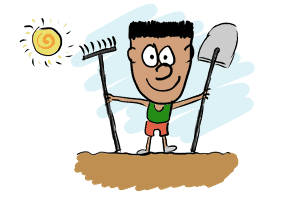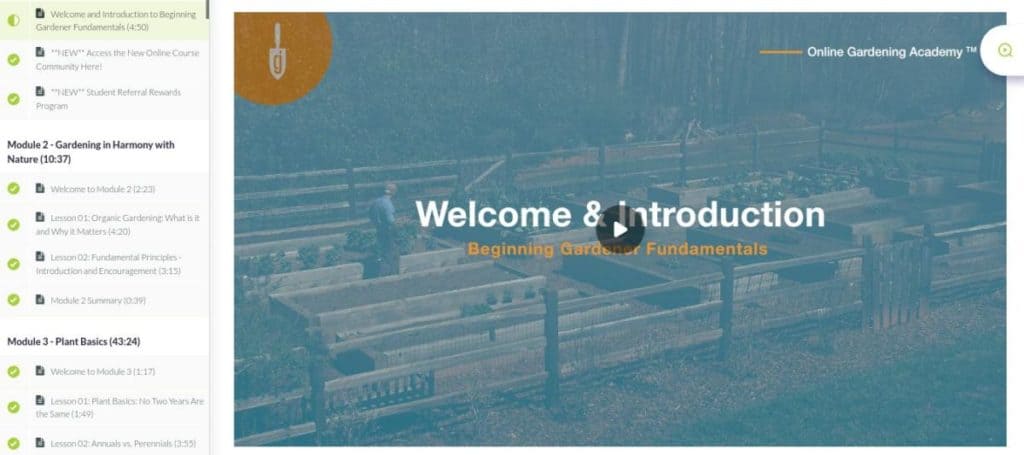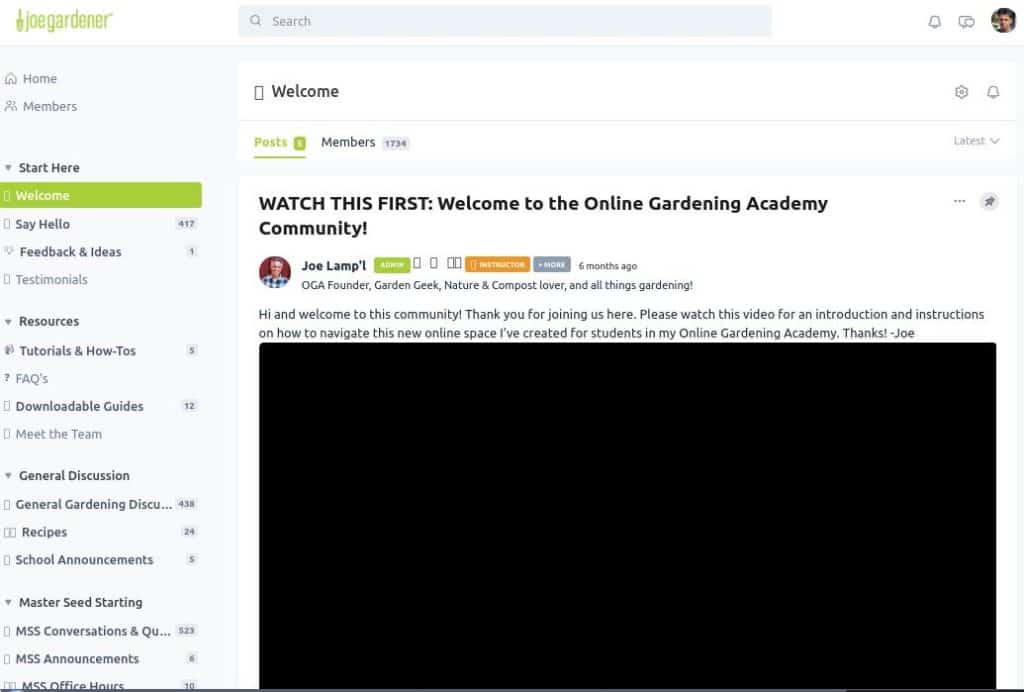Beginning Gardener Fundamentals Course Review
This is my review of the Beginning Gardener Fundamental Course you can find at joegardener Online Gardening Academy™.
I believe this is the best organic gardening course for a beginner, especially looking to grow their own vegetables. I’ve been growing plants with container gardening using information from the course.
You can find all the information and decide for yourself if it’s the right choice for learning about gardening.
Beginning Gardener Fundamentals Course
This is an online gardening course for beginners that is taught by Joe Lamp’l. It uses video training to teach you how to grow your own food using organic methods.

You go through a series of step-by-step videos that will teach you gardening concepts such as healthy soil, planting, watering techniques, composting 101, raised bed and other gardening methods, fertilizer fundamentals and much more.
What I liked about the course:
- Training covers all the steps needed to learn about growing food.
- Training from national gardening expert, Joe Lamp’l.
- 4.5+ hours video content that is easy to learn.
- Several bonus modules, including plant by plant grow guides.
- Access to an online course community of fellow gardeners.
- Weekly office hours where Joe answers students’ questions.
- Lifetime access to the course, including future updates.
- 15-day money-back guarantee.
If you’re looking to learn about growing your own organic food, check out the Beginning Gardener Fundamentals Course.
Course Details
Once you purchase the course, you get access to it on Teachable, which is a platform for online training courses.

Module 1 – Welcome to Beginning Gardener Fundamentals
This is a welcome module where Joe gives a brief introduction about himself and his gardening background. He has formal education in horticulture and has been gardening for 20+ years. So it’s great to learn from an expert about organic gardening.
He gives a brief about the different modules in the course and what you will learn as part of each.
There’s information in the module on how to join the Course community. The good thing is it’s not a Facebook group but a Teachable community. But you will need to create a user for that.
Module 2 – Gardening in Harmony with Nature
In this module, Joe gives an introduction to organic gardening. He explains what it means to use organic gardening at home and the differences than regular gardening practices.
It explains details about organic gardening such as healthy soil, organic nutrients, and watering.
Module 3 – Plant Basics
This module is about the plant basics, which include plant terminology. You’ll understand terms such as annual, perennial, heirloom, open pollinated, determinate, and indeterminate.
You’ll find information on what all plants need to grow, such as sunlight, soil, water, and nutrients.
The module will also help you buy the best plants, whether it’s seeds or seedlings you need. You’ll find information on reading labels to know more about your plants.
There’s also information on what are the best edible plants you can grow in your first year of gardening. You also get a bonus module with seed catalog recommendations provided by Joe.
Module 4 – Garden Bed Basics; Raised Beds; In-ground, and Containers
In this module, you will understand the different garden bed options that you have, such as raised bed, in-ground, and containers.
You’ll learn the benefits and drawbacks of each type of garden bed and which one can work best for your needs.
It discusses the position of the garden beds or containers and how you should plant in them considering the sunlight reaching the plants.
There’s a section on what are the best material options you have to build a raised bed, such as wood, concrete, or metal.
You also have the same selection when growing in containers. So you can choose from terracotta, plastic, metal, or ceramic pots.
One section is about containers and the things you need to take care of compared to other methods such as raised bed or in-ground.
Module 5 – Soil Basics
This module is one of the most important as it covers the soil you need for your garden. Like Joe says, “feed the soil and it will feed the plants”.
The first step here is to assess the soil that you currently have in your garden. This only applies if you will grow in-ground. For raised beds, or containers, we will create our own soil that will already be in a healthy state.
You will understand about the different soil types and which one you need for your garden. You also get tips on how to save some money when buying soil.
And at the end of the module, there is a section about the pH of the soil and why it’s an important factor for a healthy garden.
Module 6 – Composting Basics
The best amendment you can add to your soil is compost. It provides nutrients and improves soil texture. In this module, Joe explains about composting and its benefits.
You’ll understand about the components that you need to make your own compost. And what happens during the composting process.
It will give you an idea of what materials you should and should not add to your compost pile for the best results.
If you don’t have the resources and space to make your own compost, there is advice on how you can buy the best compost for a reasonable price.
Module 7 – Fertilizer Basics
Module 7 provides information about using fertilizer in your garden. It mentions certain situations like growing heavy feeder plants where you need to use fertilizer.
The module will help you understand the difference between synthetic and organic fertilizer. And you can make the choice of which you want to use. Personally, I always prefer to use organic fertilizer as it is gentle on the plants and harmless to wildlife.
You will learn about the NPK values printed on fertilizer bags and what is the meaning of each component.
Finally, the module discusses of how to apply the fertilizer to your plants and how often. It also discusses some common mistakes we can do when using fertilizer.
Module 8 – Planting Basics
This module, as the name suggests, is all about planting the seeds and seedlings in your garden. You’ll learn about the light, spacing, and depth requirements of the plants.
Understand how different plants and varieties mature at different times and how to use that to your advantage to get a constant supply of vegetables.
The plants you can grow will depend on your hardiness zone and microclimate in your garden. There’s a lesson that will help you with this.
You’ll also learn the benefits of growing native plants together with the vegetables. And about the warm and cool season plants you can grow in your garden.
Module 9 – Mulch
Mulch is one of the best things to add to the soil because it helps reduce weeds and add organic matter. And this module is all about mulch and its use.
There are a lot more benefits of mulch and Joe helps you understand why he feels mulch and compost and a must in your garden.
You’ll learn what are the different types of mulch and selecting one for your garden. I prefer using organic mulch in my plants such as dried leaves.
The module gives information on how to get mulch for your garden that is safe and free from chemicals. And figure out how much you will need for your garden.
Module 10 – Watering and Irrigation: Key Steps to Getting it Right
Probably one of the most important modules for a beginner is the watering module. Here, you learn about how much and how often to water your plants.
We have a responsibility as gardeners to avoid water waste, and that is discussed in the module. You will find information about tools such as drip irrigation, soaker hose, and bubbler systems that help reduce watering efforts while conserving water.
One important knowledge for beginners is avoiding overwatering or underwatering. The module has information about this topic.
I also liked the information on how to water the plants, as splashing water on the foliage increases the risk of pests or diseases.
There’s also a section on what to do if you’re going on a vacation and need to keep your plants watered.
Bonus Module 1
There are two bonus modules and the 1st one is about preparing your garden for fall and winter after the growing season has ended.
You also get information on how to think about the next growing season that will happen next spring. You can plan the plants you want to grow and even start looking at seed catalogs.
Joe recommends journaling your work in the garden so you get an idea of what is working and what needs improvement.
Bonus Module 2 – Plant by Plant Grow Guides
This module has one-page reference guides for several vegetables that you may want to grow in your garden. As of writing this review, I can see there are guides for about 27 vegetables.
The guides contain tips, location, spacing, pests, diseases, and harvesting information. And there are links to detailed guides on growing these vegetables.
Asking Questions
There are a couple of ways you can ask questions to Joe and his team related to the course and your gardening.
You have access to the Online Course Community in Teachable. Once you register, you can ask questions in the forum that other members or the course team would help with.
The other way to ask questions is to post it under the comments section of the video course in Teachable.
Access to Online Course Community
You can become a member of the online community and have a discussion with other members taking the course. This is a community built inside Teachable.

Weekly Office Hours with Joe Lamp’l
This is the weekly Zoom call you have with Joe where any of the members can ask the questions related to the course or gardening.
Testimonials
Below are some testimonials for the course. You can find these and many others on the course page below and inside the Online Course Community.

Conclusion
Beginning Gardener Fundamentals was the first gardening course that I took. It has helped me start my journey of container vegetable gardening. I believe it is the best gardening course for a beginner looking to grow their own food.
If you want to learn about organic gardening and growing vegetables from an expert, then I would highly recommend this course.

Fact Checked, Written, and Published by Kevin Rodrigues
Kevin is the founder of Gardening Mentor, a website that aims to teach people to grow their own food in a limited space. As a self-taught gardener, Kevin has spent several years growing plants and creating gardening content on the website. He is certified in Home Horticulture and Organic Gardening from Oregon State University. He has a Post Graduate Diploma in Horticulture and Landscape Gardening from Mumbai University.
Read more
